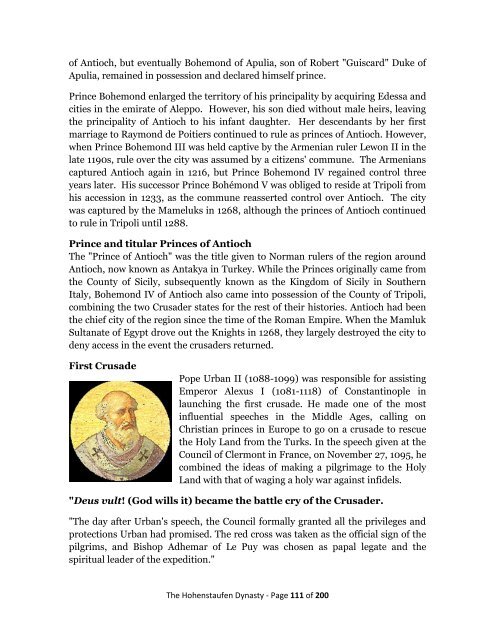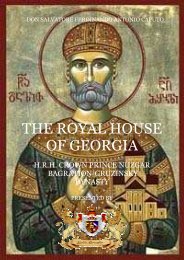here - Nobility Associations
here - Nobility Associations
here - Nobility Associations
Create successful ePaper yourself
Turn your PDF publications into a flip-book with our unique Google optimized e-Paper software.
of Antioch, but eventually Bohemond of Apulia, son of Robert "Guiscard" Duke of<br />
Apulia, remained in possession and declared himself prince.<br />
Prince Bohemond enlarged the territory of his principality by acquiring Edessa and<br />
cities in the emirate of Aleppo. However, his son died without male heirs, leaving<br />
the principality of Antioch to his infant daughter. Her descendants by her first<br />
marriage to Raymond de Poitiers continued to rule as princes of Antioch. However,<br />
when Prince Bohemond III was held captive by the Armenian ruler Lewon II in the<br />
late 1190s, rule over the city was assumed by a citizens' commune. The Armenians<br />
captured Antioch again in 1216, but Prince Bohemond IV regained control three<br />
years later. His successor Prince Bohémond V was obliged to reside at Tripoli from<br />
his accession in 1233, as the commune reasserted control over Antioch. The city<br />
was captured by the Mameluks in 1268, although the princes of Antioch continued<br />
to rule in Tripoli until 1288.<br />
Prince and titular Princes of Antioch<br />
The "Prince of Antioch" was the title given to Norman rulers of the region around<br />
Antioch, now known as Antakya in Turkey. While the Princes originally came from<br />
the County of Sicily, subsequently known as the Kingdom of Sicily in Southern<br />
Italy, Bohemond IV of Antioch also came into possession of the County of Tripoli,<br />
combining the two Crusader states for the rest of their histories. Antioch had been<br />
the chief city of the region since the time of the Roman Empire. When the Mamluk<br />
Sultanate of Egypt drove out the Knights in 1268, they largely destroyed the city to<br />
deny access in the event the crusaders returned.<br />
First Crusade<br />
Pope Urban II (1088-1099) was responsible for assisting<br />
Emperor Alexus I (1081-1118) of Constantinople in<br />
launching the first crusade. He made one of the most<br />
influential speeches in the Middle Ages, calling on<br />
Christian princes in Europe to go on a crusade to rescue<br />
the Holy Land from the Turks. In the speech given at the<br />
Council of Clermont in France, on November 27, 1095, he<br />
combined the ideas of making a pilgrimage to the Holy<br />
Land with that of waging a holy war against infidels.<br />
"Deus vult! (God wills it) became the battle cry of the Crusader.<br />
"The day after Urban's speech, the Council formally granted all the privileges and<br />
protections Urban had promised. The red cross was taken as the official sign of the<br />
pilgrims, and Bishop Adhemar of Le Puy was chosen as papal legate and the<br />
spiritual leader of the expedition."<br />
The Hohenstaufen Dynasty - Page 111 of 200



